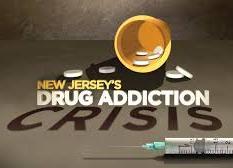Gov. Christie Signs Life-Saving Drug Addiction Reform, Ensuring Immediate Covered Treatment

Overview
Originally Published: 02/21/2017
Post Date: 02/22/2017
Summary/Abstract
Gov. Chris Christie signs bill which requires health insurance coverage for treatment of substance abuse disease as well as providing a maximum limit of five days on initial opioid prescriptions. New Jersey now has America’s strongest addiction recovery reform program.
Content
Gov. Christie Signs Life-Saving Drug Addiction Reform, Ensurin
Gov. Christie signs into law life-saving healthcare reform to guarantee insurance coverage for people to access immediate drug addiction treatment and to limit initial opioid prescriptions in Trenton.Credits: Governor's Office/Tim Larsen
TRENTON, NJ - New Jersey now has America’s strongest addiction recovery reform program following the signing by Gov. Chris Christie of Senate bill S-3/A-3, a bi-partisan measure which requires health insurance coverage for treatment of substance abuse disease as well as providing a maximum limit of five days on initial opioid prescriptions, which often become a gateway to addiction.
In addition, in a week since the state started an ad campaign about its addiction assistance programs, calls to 1-844-REACHNJ are up 50 percent.
844-ReachNJ or www.reachnj.gov provides instant, 24-hour per day, free drug addiction related help.
According to Pew, four out of five new heroin addicts start with prescription opioid drugs. Most states allow opioid prescriptions to last seven days or many states significantly longer, New Jersey will now lead the way in that regard, Christie said.
"When a person who is in the throes of addiction, as you know, realizes he or she needs help, they should not be blocked at the treatment center doors with their life hanging in the balance, because their insurance carrier requires a pre-evaluation that could take weeks to complete. Now, with this legislation, people seeking treatment cannot be denied access in their time of need," he said.
Christie said that there was a 22 percent increase between 2014-2015 in drug overdose deaths with a 30 percent increase in heroin deaths over the previous year and triple the number of deaths caused by fentanyl.
"That's 1,600 lives lost in 2015 alone," he said. "That’s four times the number of people who were murdered in New Jersey in 2015, and three times the number of people who died in an automobile accident."
No one now under this legislation will be turned away from treatment for insurance reasons, if licensed provider prescribes substance abuse disorder treatment. Insurance coverage for treatment of substance abuse disorder will be required and any waiting period that could derail a person’s recovery is eliminated by this bill.
People diagnosed with a substance abuse disease will have covered treatment for 180 days, starting the day they need it, including long-term out-patient treatment with no interference from their carrier, making New Jersey the only state in the nation in which people with insurance cannot be retroactively charged for six months of necessary addiction treatment.
The Office of Attorney General is tasked with monitoring the system to prevent waste, fraud or abuse, and to ensure providers are not improperly treating patients or filling beds that could be used by those who are truly in need of treatment. A five-day limit on initial opioid prescriptions will be imposed, lowered from 30 days, which is the current law.
"This is not going to impact cancer and hospice patients or residents of long-term care facilities, that was carefully opted out of the bill by the legislature with my consent," Christie added.
In addition, a requirement that physicians inform patients about the potential dangers of opioid use before issuing the prescription is now law in the State of New Jersey. And ensuring that physicians who prescribe opioids take continuing education courses on the issue as part of their licensure requirements.
1-844-REACHNJ
"It’s not that people don’t need help, it’s that they don’t know where to go for help," Christie said. "And they’re kind of scared to ask for help, and sometimes embarrassed to ask for help. And the more I can go out there and put the face of the leader of this state in front of them saying, ‘Don’t wait, don’t suffer, pick up the phone and start to get help today.’
Addiction is not a moral failing, Christie said. It is a disease and the more that we talk about it as a disease, treat it as a disease, regulated it as a disease the more people will finally get the idea that asking for help is not a sign of weakness, but it is in fact a sign of strength.
"It will send a signal to parents that asking for help for your child is not a sign that you’re a bad parent, but a good one. It will show husbands and wives across the state that being married to someone with the disease of addiction is not a failure by you as a spouse, but to ignore that problem is a failure. We need to understand that this is the only way we are going to change this problem across our state and hopefully across our nation."





